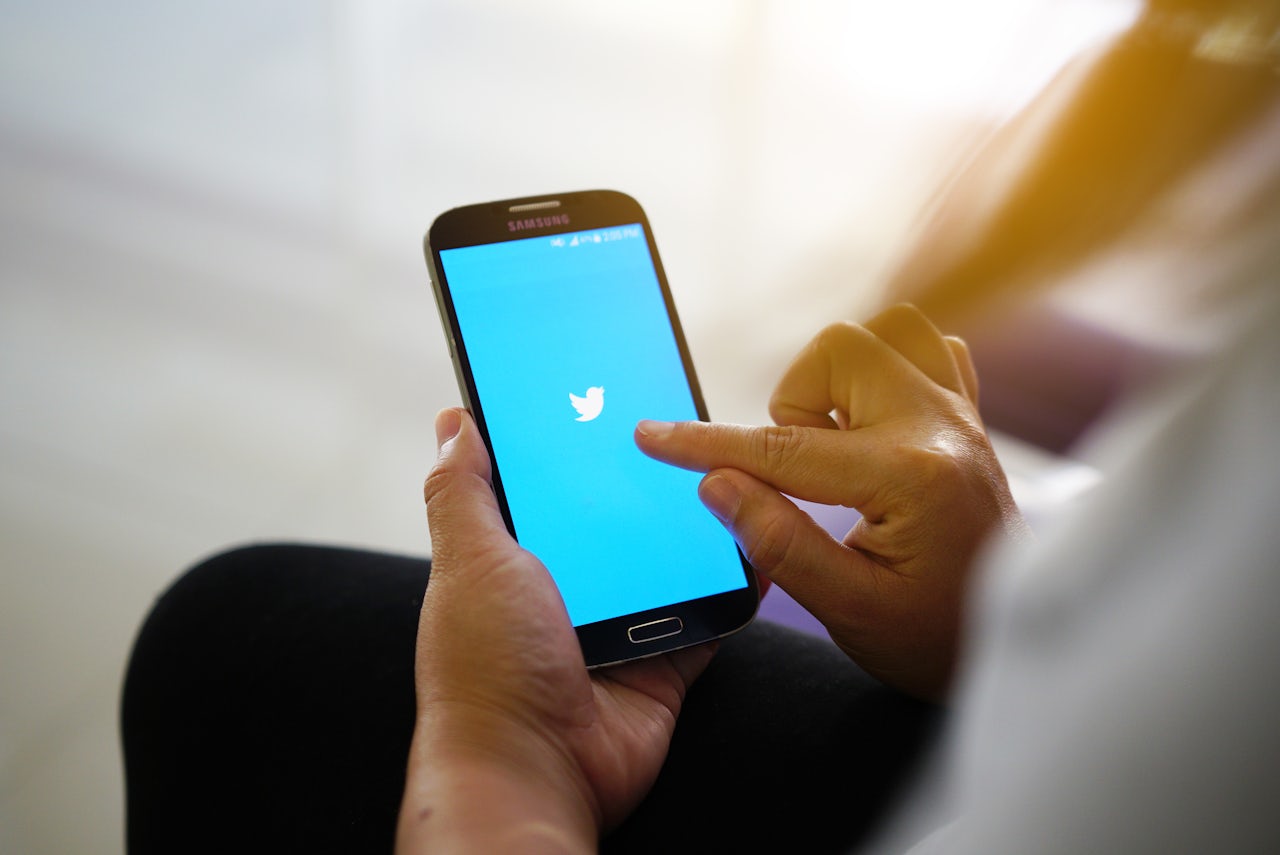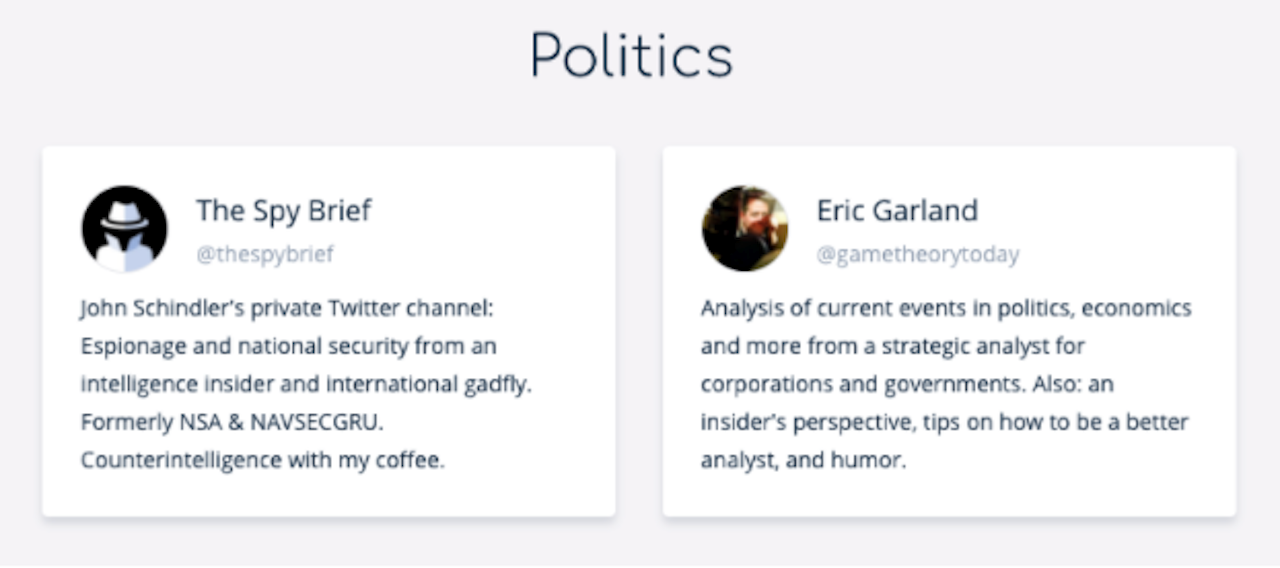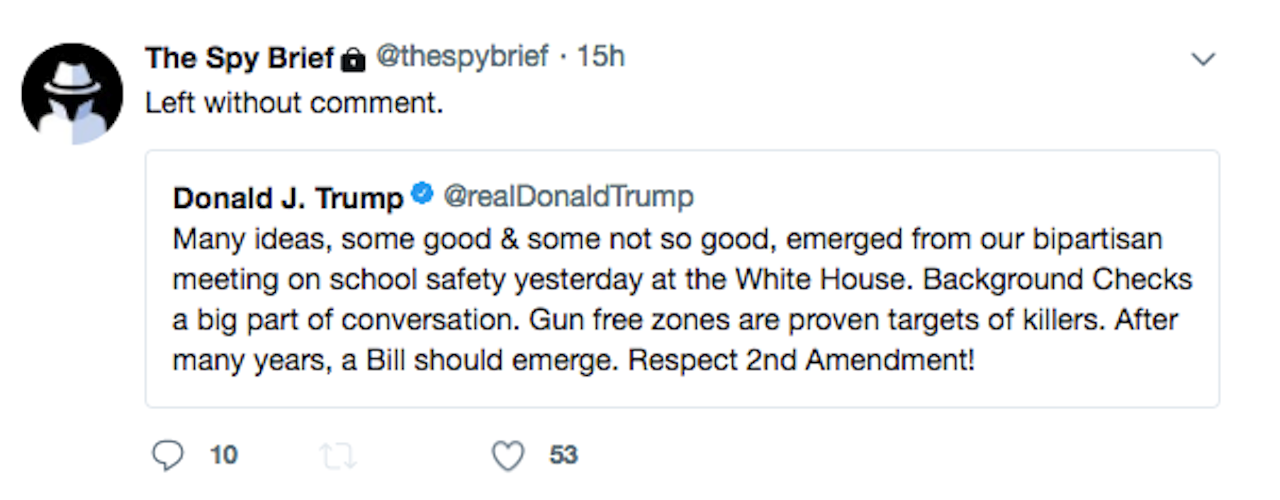Facebook and Twitter have both pledged never to charge users a monthly fee for their basic services, partly in response to persistent hoaxes claiming otherwise. And why would they? Social media is already barely interesting enough to retain an audience for free, so what would anyone stand to gain by charging exorbitant subscription fees for the same stream of bland, derivative content? A lot, actually — provided they only charge that fee to the most gullible subset of their audience.
Premo, a startup founded in July 2017, allows “the most respected thought leaders online” to sell access to “gamechanging insights” on their locked Twitter accounts for between $10 and $30 per month. (The site has an application form for new creators, but I counted only 17 so far.) After Premo has your credit-card information and access to your Twitter account, it automatically sends and accepts a follow request to the desired paragon of insight. After this initial setup, the premium account appears on your regular old timeline, its tweets bumping elbows with publicly available riff-raff. As with any locked account, the tweets cannot be retweeted, quoted, embedded or linked. Doing away with most of Twitter’s social functions is the only way to keep the premium information scarce — and therefore valuable — but it raises the question of whether the business model needs Twitter at all. Couldn’t all this be done through Patreon, which allows creators to put a paywall on blog posts, or even a private Wordpress blog?
Apparently not. The site’s first “thought leaders” were financial advisors like pro gamer-turned-day trader Mark Melnick (@t3newsbeat), who charges $29.99 for Bitcoin advice, and the suggestivelynamed “Inflation_GuyPV,” who undercuts him at $10. Melnick has only 15 followers, perhaps due to his outrageous pricing scheme, but that still nets him a respectable $450 per month. In January, Premo added a politics section, and this is where its biggest-ticket tweeters now lie: the notorious Twitter bloviators John Schindler and Eric Garland, who have on their public accounts a respective 266,000 and 175,000 followers.
Schindler, a former NSA officer who is perhaps best known for a 2014 dick pic scandal that forced him to resign as a Naval War College professor, has 1,713 premium followers paying him $10 each for an approximate monthly income of $17,000. During the Obama years, Schindler developed a large Twitter following as a center-right foreign policy hawk and staunch defender of NSA surveillance programs. Naturally, he immediately found a home on the #Resistance once Trump was elected. The contents of his premium account, titled “The Spy Brief” and described as “Twitter without the BS. Real discussion minus trolls, bots or Kremlin-y miscreants,” are remarkably similar to what he posts on his public feed.
There are quote tweets of Donald Trump, links to CNN articles about the Russia investigation captioned with different phrasings of “I told you so,” and frequent warnings to watch out for Kremlin trolls. At best, you might get some broad geopolitical analysis that borders on xenophobia: “The most important fact about the rise of China to great power status is that almost all their neighbors hate them, and have for thousands of years. For good reason.” In other words, premium Schindler is just free Schindler behind a paywall.
Eric Garland comprises the other half of Premo’s politics section, charging $10 per month to 307 subscribers. Anyone prone to observing online freakshows is probably familiar with him by now, but if not, here’s a quick recap. Garland is a corporate consultant and amateur salsa bassist who, in December of 2016, wrote a meandering, nonsensical 127-tweet thread about Russian malfeasance and game theory that won praise from big-shot journalists like Vanity Fair’s Kurt Eichenwald and Washington Post reporter David Fahrenthold. (Compiled into essay form, the incoherence of Garland’s prose is much more obvious. This may be why he and Schindler are unable to monetize their writing outside of confusing Twitter add-ons.) His brief success at feigning insight went to his head, and he soon began spinning more bizarre theories (“Bernie Sanders has been, and continues to be, an agent of influence for Vladmir [sic] Putin.”) and lashing out at any journalist who questioned his foreign policy credentials.
You see this, you amoral scum-sucking media whores? This is my direct grandfather's paystub from the Revolutionary War. pic.twitter.com/72WOwjlrF4
— Eric Garland (@ericgarland) March 23, 2017
(This past December, a year after he first joined the #Resistance, Garland discovered that he was a frequent item in articles like AV Club’s “The worst things on the internet in 2017” and Splinter News’s “The Least Important #Resistance Figures of 2017.” He took the fact that all these year-end roundups were published simultaneously — at the end of the year — as evidence of an organized Russian campaign to discredit him. He concluded that Gizmodo Media Group, Vanity Fair, Business Insider and a whole host of other media outlets were part of a Russian “influence op.”)
Your industry can burn. I will approach you professionally, as I do every activity, but how dare you? You tiny souls. You malignant professionals. How dare you treat anyone this way. You'll hear from me. Goddamn you.
— Eric Garland (@ericgarland) December 24, 2017
Garland’s paranoia about Russian psyops and being mocked by journalists made him a natural candidate for a locked premium account, and he launched his shortly after the aforementioned Gizmodo meltdown. No one is so determined to give me a hard time that they would pay $10 to make fun of my tweets, he thought, wrongly. Like Schindler, Garland tweets the same way in private as he does in public. The first thing I saw after Premo charged my credit card was a lengthy thread about the 2017 film Wonder Woman and its role in the fight against Russian interference. When not recapping superhero movies, Garland posts links to CNN and makes seemingly random predictions, like that the “next 48 hours are gonna be something we tell kids about.” That was posted on the evening of February 28, well over 48 hours ago, and what actually happened? Are we telling kids that Trump proposed a tariff on imported steel?
Who, other than me, is willing to pay $10 per month for links to New York Times articles and sarcastic quote-tweets of Trump, both of which are readily available for free? A lot of middle-aged liberals who still have ��stable genius” or “covfefe” in their display names, it turns out. Very few people of note follow either Schindler or Garland, which brings their advertised status as “thought leaders” into question. Louise Mensch, the British MP turned Russia conspiracy theorist, follows both, as does comedian Jen Kirkman. Other than that, it’s a relatively undistinguished crowd. Both tweeters are making a profit, but putting a hefty price tag on their commentary doesn’t seem to have added much prestige.
It’s tempting to think of the poor saps paying $10 for tweets as victims of a scam, but they’re free to cancel their subscriptions any time they want. Fourteen months into the Russia scandal, even the most crazed Robert Mueller devotees must know on some level that none of this is as big a deal as cable news would have us believe. MSNBC covers the investigation every night because it brings in ratings, and people tune in because it gives them the same secondhand excitement they got from the O.J. Simpson trial. They want to feel like they’re privy to some secret information, and if getting their boilerplate commentary from a private account makes the fantasy more real, who am I to judge?



